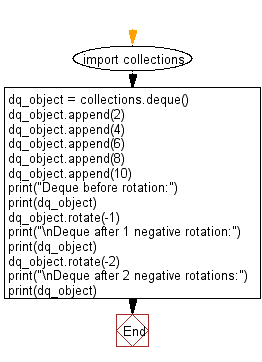Python: Rotate a Deque Object specified number (negative) of times
14. Rotate a Deque a Specified Number (Negative) of Times
Write a Python program to rotate a deque Object a specified number (negative) of times.
Sample Solution:
Python Code:
# Import the collections module to use the deque data structure
import collections
# Declare an empty deque object named 'dq_object'
dq_object = collections.deque()
# Add elements to the deque from left to right
dq_object.append(2)
dq_object.append(4)
dq_object.append(6)
dq_object.append(8)
dq_object.append(10)
# Print a message to indicate the display of the deque before rotation
print("Deque before rotation:")
# Print the content of 'dq_object'
print(dq_object)
# Rotate the deque once in the negative direction (to the left)
dq_object.rotate(-1)
# Print a message to indicate the display of the deque after 1 negative rotation
print("\nDeque after 1 negative rotation:")
# Print the content of 'dq_object' after one negative rotation
print(dq_object)
# Rotate the deque twice in the negative direction (to the left)
dq_object.rotate(-2)
# Print a message to indicate the display of the deque after 2 negative rotations
print("\nDeque after 2 negative rotations:")
# Print the content of 'dq_object' after two negative rotations
print(dq_object)
Sample Output:
Deque before rotation: deque([2, 4, 6, 8, 10]) Deque after 1 negative rotation: deque([4, 6, 8, 10, 2]) Deque after 2 negative rotations: deque([8, 10, 2, 4, 6])
Flowchart:

For more Practice: Solve these Related Problems:
- Write a Python program to rotate a deque to the left by one position using a negative rotation value.
- Write a Python program to perform multiple negative rotations on a deque and output the final configuration.
- Write a Python program to use a loop to rotate a deque negatively and print the deque after each rotation.
- Write a Python program to compare negative rotations with positive rotations by normalizing the rotation count.
Go to:
Previous: Write a Python program to rotate a Deque Object specified number (positive) of times.
Next: Write a Python program to find the most common element of a given list.
Python Code Editor:
What is the difficulty level of this exercise?
Test your Programming skills with w3resource's quiz.
